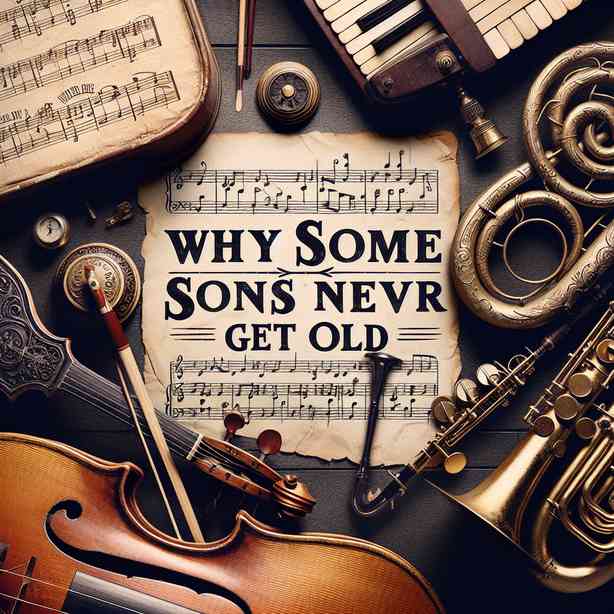
Some songs seem to withstand the test of time, resonating with generations of listeners long after their initial release. The phenomenon of certain songs never getting old can be attributed to a combination of factors, including their lyrical depth, memorable melodies, emotional connection, cultural relevance, and enduring influence. In this exploration, we delve into what makes these timeless tracks appealing and how they manage to remain relevant in our rapidly changing musical landscape.
One of the key elements that contribute to the timelessness of a song is its lyrical content. Songs that feature profound themes—such as love, loss, hope, and resilience—tend to resonate on a personal level with listeners. These universal experiences allow individuals to connect deeply with the music, often evoking memories or emotions tied to their own lives. For instance, classics like “Imagine” by John Lennon or “Bohemian Rhapsody” by Queen delve into themes of utopia and existential questioning, respectively. Such themes speak to the human condition, ensuring that new listeners can find meaning in them, regardless of when they first hear the song.
Melody also plays a vital role in a song’s longevity. Catchy, memorable melodies are often what draw listeners in and remain lodged in their minds long after the first listen. Simple yet effective hooks have the power to make a song unforgettable. Think about the soaring chorus of “Don’t Stop Believin’” by Journey—it’s a melody that invites participation and makes people want to sing along. These engaging melodies create an auditory experience that transcends time, capable of appealing to people across various age groups and musical preferences.
Additionally, emotional connection is a significant factor in a song’s enduring appeal. Music has a remarkable ability to evoke emotions, and songs that successfully tap into feelings of nostalgia, joy, sorrow, or empowerment can leave a lasting impact. For instance, Marvin Gaye’s “What’s Going On” resonates deeply with listeners due to its poignant commentary on societal issues while simultaneously capturing feelings of love and unity. Such emotional depth allows these songs to create a sense of intimacy and connection with listeners, making them feel seen and understood.
Cultural relevance is another critical aspect that influences a song’s ability to stay fresh and meaningful. Many songs address societal issues or events, offering commentary that remains pertinent over time. For instance, songs like “Fight the Power” by Public Enemy speak to issues of racial injustice and inequality—a theme that continues to be relevant in today’s conversations. As societal dynamics evolve, these tracks gain new layers of meaning, ensuring that they are continuously discussed and rediscovered.
Furthermore, the influence of a song’s artists and their careers can contribute to its lasting power. Artists who become cultural icons often bring their music along for the ride, ensuring that their songs remain in the public eye. For example, songs from legends like Bob Dylan, Aretha Franklin, and David Bowie not only defined their eras but also inspired countless artists who followed. The continued recognition and celebration of these artists in contemporary culture help their music endure, as new generations are introduced to their work.
The marketing and promotion of music throughout the years can also play a significant role in the longevity of certain songs. In the digital age, the way music is consumed has changed dramatically, but certain tracks manage to find their way back to the forefront. The resurgence of vinyl records and the popularity of nostalgia have allowed old hits to experience renewed interest. Playlists on streaming platforms, DVD soundtracks, and usage in television shows or movies often revive classic hits, introducing them to new audiences who may not have experienced them otherwise.
Moreover, the communal experience of music can contribute to the timelessness of songs. Collective listening—whether at concerts, parties, or communal gatherings—creates shared memories that enhance the emotional weight of certain tracks. Songs that evoke a sense of togetherness, such as “We Are Family” by Sister Sledge, become anthems of camaraderie and celebration. The shared experiences associated with these songs often create lasting bonds between listeners and the music itself, leading to a multifaceted appreciation that only grows with time.
In addition, the role of technology cannot be overlooked. The rise of the internet and social media has transformed how music is shared and consumed. Viral trends or challenges can rejuvenate interest in older songs, breathing new life into tracks that may have otherwise faded from public consciousness. For instance, songs like “Never Gonna Give You Up” by Rick Astley have gained a second life through online memes, showcasing how the digital landscape can help preserve and even elevate older music through new contexts.
Lastly, personal nostalgia plays a significant part in why some songs never get old. Music often triggers strong memories, transporting listeners back to specific moments in their lives. The emotional connections tied to these memories can make a song feel timeless, as individuals hold onto tracks that shaped significant events in their lives—be it a wedding, a road trip, or a rite of passage. This sentimental value ensures that as long as people remain connected to their past, the songs that accompanied those moments will continue to be cherished and celebrated.
In conclusion, the reasons why some songs never get old are numerous and interwoven. The combination of deep lyrical content, memorable melodies, emotional resonance, cultural relevance, and the influence of artists ensures that these tracks remain relevant and cherished across generations. As we continue to navigate through different musical landscapes, and as new technologies create new ways of experiencing music, we are likely to witness the sustained appeal of these timeless songs. Whether it’s through shared experiences, personal nostalgia, or cultural significance, the melodies and lyrics of these classic tracks will continue to echo in the hearts of listeners for years to come. So, let us celebrate the songs that have stood the test of time, as they remind us of our shared humanity and the power of music to connect us all.


